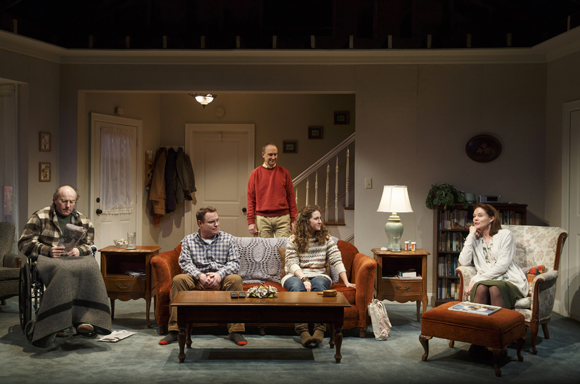
(© Joan Marcus)
A Will Eno play always seems to leave the audience walking out asking the same question: Was that the greatest thing I've ever seen or the most awful? It's a fittingly existential question for a playwright widely considered to be this century's answer to Samuel Beckett, one whose works explore lofty subjects including life, death, and our place on this planet. When the lights come up on Eno's latest, The Open House at Signature Theatre, all you know is that, in 80 minutes, he has picked apart an entire genre, thrown the pieces into the air, and refused to put them back together. That in and of itself is mind-blowing to watch.
The Open House is Eno's version of the Family Play. Eno does not ask nor answer questions of "blood and duty and inheritance and responsibility" (as stated in the press notes) that are commonly posed in such dramas, a category that dates back to the Greeks. Instead, in a living room he sticks a five-member clan, gives them some of the most bitter, cruel dialogue to spew, and then, one by one, they're replaced by other people. In doing this, Eno systematically destroys the conventions of the standard unhappy family drama and creates a new kind of family play: one in which the people aren’t miserable.
At rise, Dad (Peter Friedman), as he is referred to in the script, wheelchair-bound after a stroke, and Mom (Carolyn McCormick) are celebrating — if you can call it that — their anniversary with their Son (Danny McCarthy) and Daughter (Hannah Bos). Dad’s brother (Michael Countryman) is there too, if only because he’s got no other place to be. They wallow around the living room (designed with a TV sitcom’s just-slightly-uncomfortable hominess by Antje Ellermann), as Dad picks on everyone, Mom does a puzzle, and Son and Daughter wonder why they came home at all. Soon, Daughter decides to leave and get lunch. Son departs to pick up his girlfriend. Uncle goes to the store to purchase medicine for his brother.
What we don't know is that the very grumpy Dad has a secret: He's decided to sell the old homestead, and it's the day of the open house. Suddenly a real estate agent (played by Bos) enters and begins to make the place just a little brighter. Shortly thereafter, Mom scurries away when she discovers that her daughter had an accident. Soon, Dad is the only one left with the real estate agent and her posse, played by the same actors as his family members in different costumes (which are believably designed by Bobby Frederick Tilley II). Even he has to go, though, and Dad makes an exit in a bracingly sad fashion as he sees around him what resembles to be his family, but they're just not.
Suddenly, The Open House morphs into a play about a particularly happy family getting ready to buy a home and start new lives. Eno has literally erased a family as miserably unhappy as the Tyrones of Long Day's Journey Into Night and the Lomans of Death of a Salesman from the canon of American theater to make room for a contented one.
The five actors turn in excellent work on both sides of the coin, but its Friedman who steals the show, with his dry, sarcastic retorts (Eno at his funniest) and a helluva withering glance. The playwright is perfectly matched by director Oliver Butler, who gets Eno's oeuvre and style remarkably well.
Dramaturgically, not only is the text incredibly well-structured in its dismantling of the classic family-play genre, but it is also quite thought-provoking about the state of theater. Eno’s work challenges the audience to ask the question: Why are families always fighting onstage, screaming at one another in kitchens and bedrooms? Perhaps happy families, those that love one another, don't make for such a heady evening of theater. As Eno seems to suggest, maybe, just maybe, they do.










